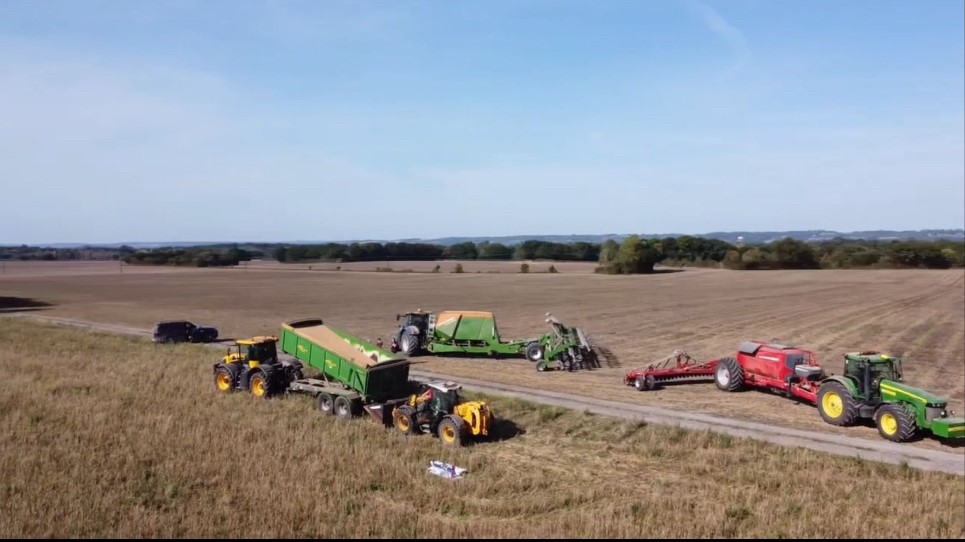Dec 2023
This summer my eldest 2 children sat their A-Levels and GCSE exams. Both did very well and their grades have earned them places at their chosen University and sixth form to continue their studies. Last year I spent quite a few days taking Emma, my eldest, to University open days. It was fascinating to visit different areas across the country and see where she could spend the next three years of her life (as well a check out the farming en-route!). I remember doing the same thing many years ago (although it feels much more recently that I started at Harper Adams).
Remembering back to my sixth form days and looking through university prospectuses, I was always fascinated by the degree “Disaster Management”. I often wonder what would have been in the course and what job you’d end up with?! Well this summer I realised that’s the course I should have taken all those years ago! There’s a saying “what doesn’t kill you makes you stronger”!
Well this year has done just that! With Emma and James in “exam-mode” from April ‘til June we decided to have a very low-key early summer. We had a grainstore floor and apron to lay as well as some drains and landscaping to complete, as well as hay to make so I decided not to attend any shows or festivals this year. I farm with my parents and my wife Sarah, with Dad and I doing all the practical day-to-day work! From about April time this year (2023) Dad had started complaining of sore feet and was struggling to stand still. His feet continued
to deteriorate through the early summer and although he could drive to mow grass or row-up hay he was struggling to move about the yard and was reluctant to do any maintenance, which is quite unlike him. For my whole life he has always been the combine driver! I’ve never been interested in the job to be honest, preferring to manage the store, load out lorries, and organise everything that’s going on.
Dad started the harvest as he’s done for the past 50+ years but from day 1 was struggling with his feet and health. One morning I got the call to help him out of bed as he couldn’t walk! It took me 20mins with Mum to get him out of bed, down the stairs and into the kitchen! 48hrs later he was in intensive care with the nurses preparing a ventilator.He was diagnosed with vasculitis and spent one day short of 12 weeks in hospital! Today I took him to the oncology department for his final infusion of immunosuppressant drugs.
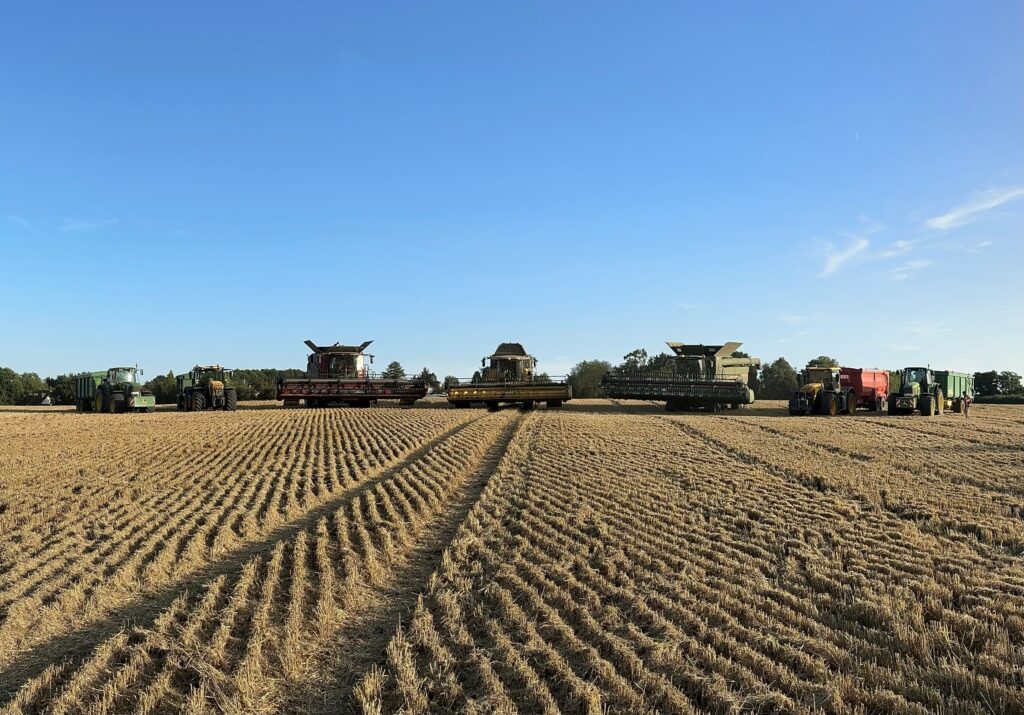
The road to recovery will be long but he’s now home. So, my first lesson in disaster management was how to manage harvest (with 75% still to cut) when my combine driver was rushed in to hospital and out of action. Our only other staff member was Lewis, a Harper student, who had limited harvesting experience but who did superbly well having to cope with a sudden change in working conditions. This is where your friends come into play. In Guy Eckley and Jo Forknall I have 2 of the best farming friends (and neighbours) you could wish for! Interestingly for a little while we have been talking about the potential for collaboration between our three businesses. We all farm within 8 miles of each other with our three farms forming three corners of a triangle. We are all similar aged (ish!) and our farm sizes are all within a few hectares of each other.
More importantly we are all trying to farm in a similar way, get on very well and have a similar attitude to life! I had said to them once that when our combines or our fathers needed replacing we would take a gulp and say “how much?!” Well now was that time, and it wasn’t a joke any more. Guy immediately lent me George (his combine driver) for an afternoon and I reluctantly had to sit on the combine! It was hard work and stressful but somehow we got harvest finished. A self-employed chap called Liam appeared by recommendation from a friend and he joined in as though he had been on the farm for ten years, enthusiastically carting grain, topping some huge summer cover crops and generally being proactively helpful. For a few days both Guy and Jo brought their combines and we cut as a team of three which was actually a lot of fun and very productive.
Meanwhile my wife Sarah had sprung into superhero mode and was not only managing the social lives of our 4 children over the summer holidays, running the farm office and providing meals, she was also visiting dad regularly and feeding Mum every evening, who was now a harvest widow for a completely different reason!
So harvest got finished somehow! Yields were poor following early promise. Proteins were also down which was particularly disappointing but by the end of harvest I was past caring to be honest. From when Dad went into hospital I finished driving the combine on the wheat. Before Jo and Guy came to help we had 6 combine breakdowns in 6 days which seriously tested my patience and had me questioning my career choice on more than one occasion! Special thanks to Neville from Manns Kent who saved us when we were really struggling. Another contact and local agronomist, Andy Pendry, was suddenly available when our 100ha of beans needed harvesting. Having previous combining experience, he effortlessly jumped into the big red combine seat and purred through the beans.
With harvest finished our attention turned to compost spreading and a few bits of field work. The huge benefit of being a no-till farm came into sharp focus here as there was pretty much nothing to do in the fields. A few fields of low disturbance subsoiling with the Sumo LDS for a neighbour polished up the points but that was about it. I also took the decision to ruthlessly cull any operation that wasn’t essential. I could see that the yields were reduced, the wheat price reducing and costs at an all time high! This wasn’t a year for any luxuries.
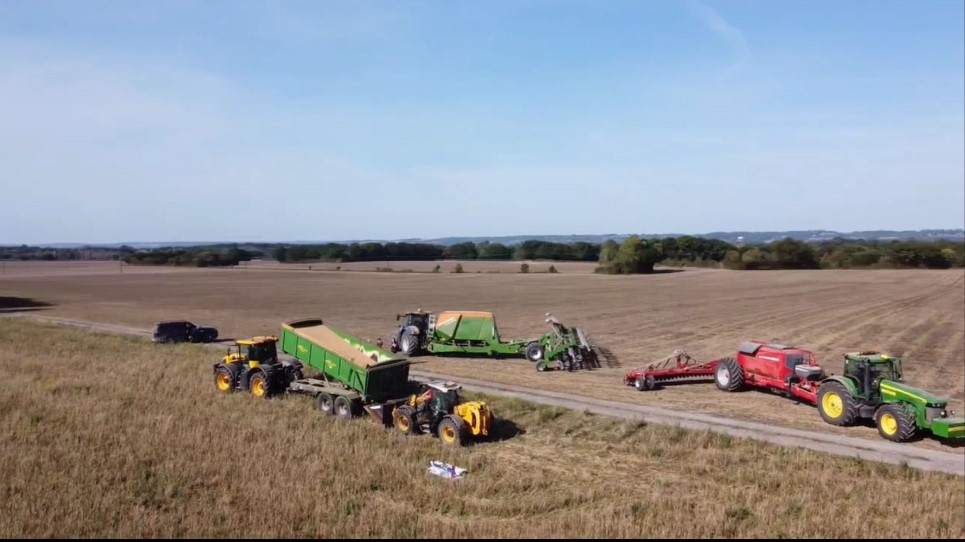
With Dad still in hospital as Lewis returned to Harper for his second year, we embarked on a series of breakfast meetings with Jo and Guy taking time to sample the local cafes, golf courses and farm shops to see who’s breakfast and coffee was then best! With Guy running a 12m Amazone Condor drill and us running a 12m Horsch Avatar we decided to form a drilling gang. We made a plan of attack which meant planting all the Weald Clay land first before going up on the hill for the land over stone (where I farm) to finish. The thought behind this was that the clay land wanted to be planted earlier as when it gets wet it takes longer to dry out. (or doesn’t in many cases).
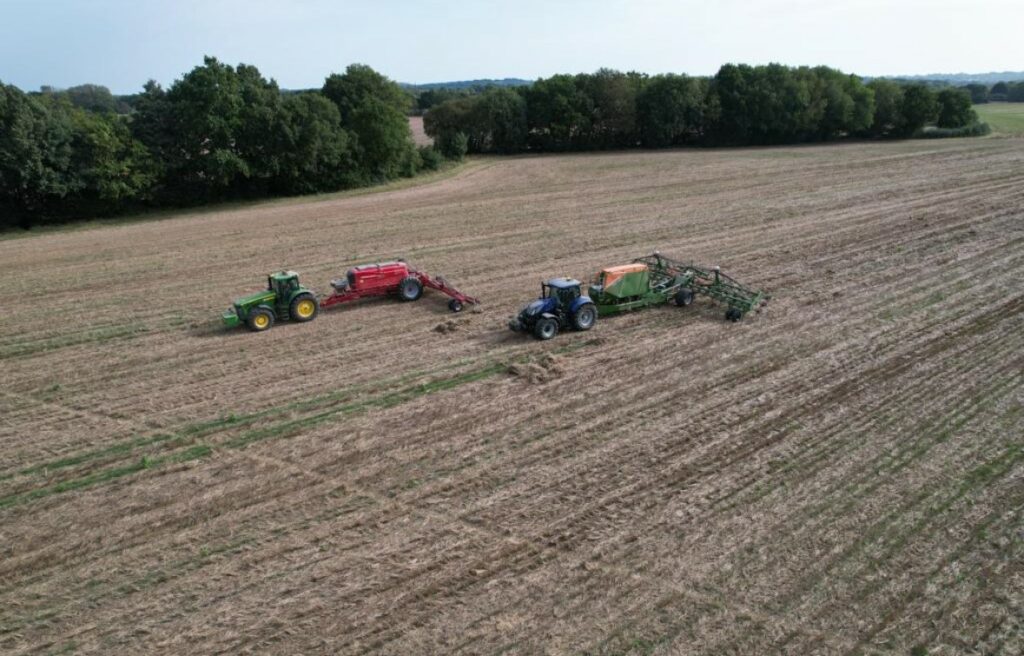
The plan worked really well with both drills working in the same field on a few occasions. The drill operators George and Harry (who we borrowed from Jo) managed to sync the GPS so that there were no overlaps and no misses. Seeing 24m at a time planted certainly is impressive in Kent fields! Having been disappointed with my Extase this year we have decided to create a blend going forward to hopefully achieve some higher proteins.
As has been the case for a few years now, all seed has been cleaned only, with no seed dressings applied. The first wheats that we have managed to plant into bean, oat and cover crop stubbles have emerged quite slowly but evenly. With the virtually non-stop rain since the middle of October soils went from concrete to too wet very quickly.
Sitting here writing this on the 27th November with the drill still on the back of the tractor in the shed I think it’s now pretty unlikely that we will plant anything else before the New Year. The ground destined for second wheat will now most likely be planted with spring oats and we are looking very seriously at using a number of the SFI options as a soil building break crop now. This would mean that the combine, sprayer and drill would all do considerably less work on our farm. It does feel like an admission of failure in farming, but to get a guaranteed margin for a break crop that builds soil and allows for a good clean entry for wheat seems very appealing.
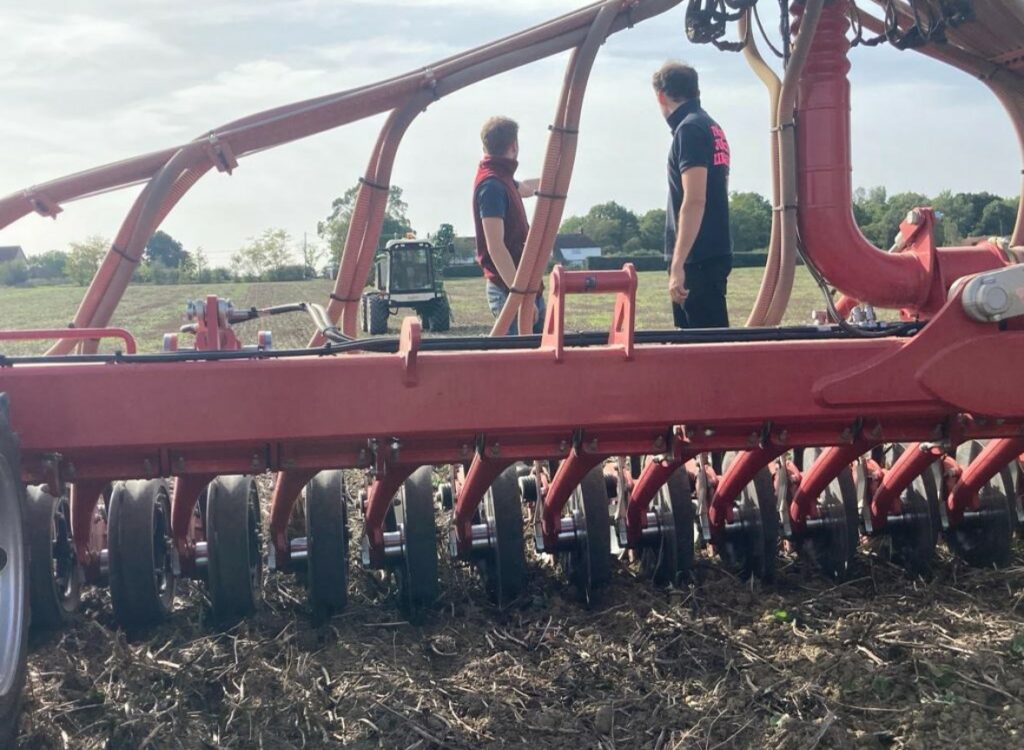
Now that we’re on the run-in to Christmas (2023) our attention has turned to hay & log sales, winter meetings and time in the office and workshop. We are in the process of relocating our workshop to a bigger and better location but this involves sorting through the old workshop and finding things we kept 20 years ago because “they might come in useful one day”. Farming on my own, now that Dad is confined to the house, has made me somewhat ruthless in having a good clear-out! It’s amazing how little you actually need when there’s no cultivations required.
I’m still scratching my head as to the best way of getting bulk seed into the drill when a full-fill is the best part of 5 tons.This year we have had 7 bulk bags split on us. They were all brand new bags and one split when it was hanging over the drill hopper! Fortunately Harry wasn’t underneath but my new-found ruthless streak has resulted in every empty bag leaving the farm in a skip! Farm safety is something I simply won’t compromise on and we WILL find a way of getting bulk seed into the drill safely, quickly and simply which doesn’t break the bank.
If anyone has any great ideas that doesn’t involve the tele-handler in the field, I’d love to hear from them? Otherwise I’d like to wish you all a very relaxing Christmas break and a safe and enjoyable 2024.


